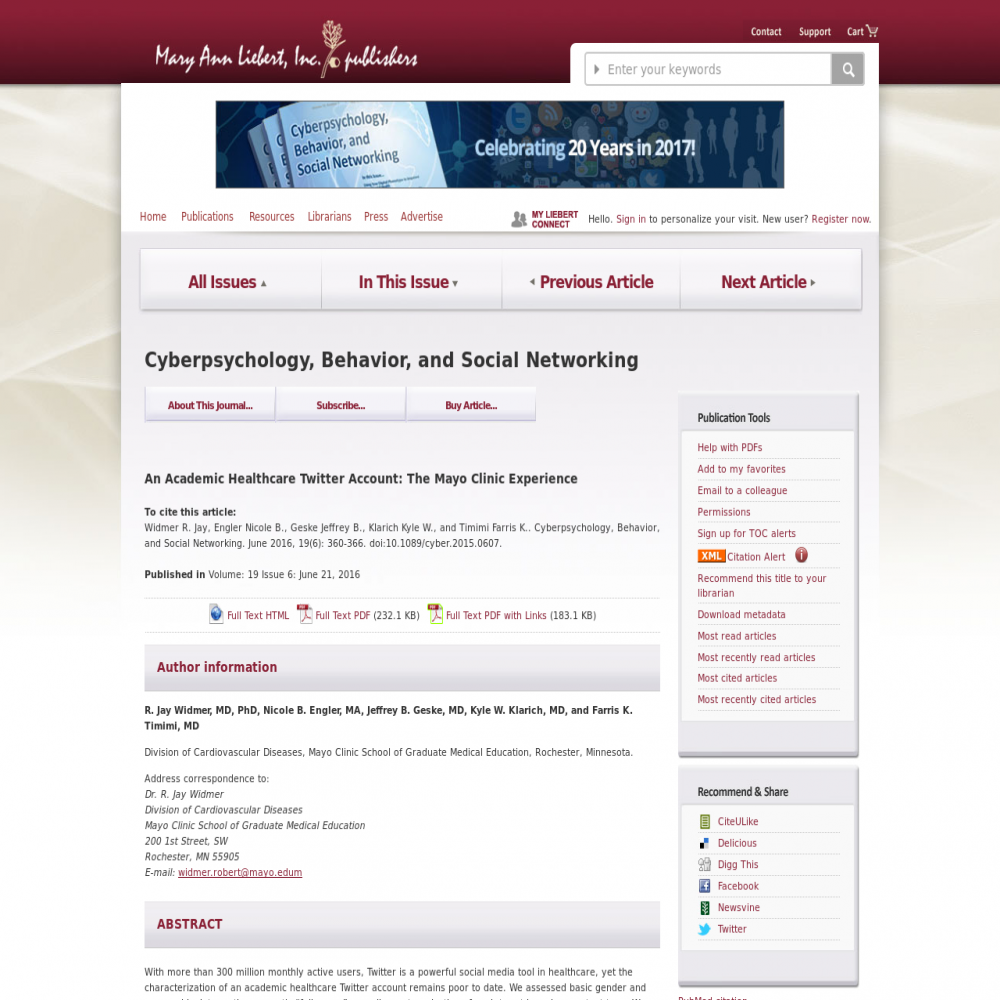An Academic Healthcare Twitter Account: The Mayo Clinic Experience
A healthcare social media research article published in Behavior & Social Networking, June 1, 2016
- Title
- An Academic Healthcare Twitter Account: The Mayo Clinic Experience
- Authors (alpha)
- Farris K. Timimi, Jeffrey B. Geske, Kyle W. Klarich, Nicole B. Engler, Robert Jay Widmer
- Published
- June 1, 2016
- Journal
- Behavior & Social Networking
- DOI
- 10.1089/cyber.2015.0607
- Pubmed
- 27327062
- Altmetric
Abstract
With more than 300 million monthly active users, Twitter is a powerful social media tool in healthcare, yet the characterization of an academic healthcare Twitter account remains poor to date. We assessed basic gender and geographic data on the account's "followers," as well as categorization of each tweet based on content type. We analyzed the impressions, engagements, retweets, favorites, replies, hashtag clicks, and detail expansions using both Sprinklr and Twitter Analytics. Over a period of 12 months, the account amassed 1,235 followers, with 54 percent being male and 68 percent residing in the United States. Of the 1,635 tweets sent out over the life of the account, we report more than 382,464 impressions, 6,023 engagements, 1,255 retweets, 776 favorites, and 1,654 embedded media clicks in this period. When broken down by tweet category, publication tweets garnered the highest engagement with an estimated mean number of clicks per tweet of 8.2 ± 81.9. Original content had higher total engagement per tweet than retweeted material (2.8 ± 9.2 vs. 0.2 ± 0.9 engagements per tweet; p < 0.0001). Tweets regarding internal, national, and continuing medical education events had similar engagement. Herein is the first publication within the medical literature describing a "case series" of cardiovascular tweets over 12 months. We highlight a rapidly emerging group of interactive followers, a successful means by which to disseminate and engage in breaking topics throughout the cardiovascular field, and the importance of combining physician-led knowledge with intermittent marketing messages.
Altmetric
The Altmetric Attention Score is based on the attention a research article gets on the internet. Each coloured thread in the circle represents a different type of online attention and the number in the centre is the Altmetric Attention Score. The score is calculated based on two main sources of online attention: social media and mainstream news media.
Healthcare Social Media Research
See the full list of healthcare social media research articles with data from or reference to Symplur.
#hcsmR is a collaboration between Stanford Medicine X and Symplur.


